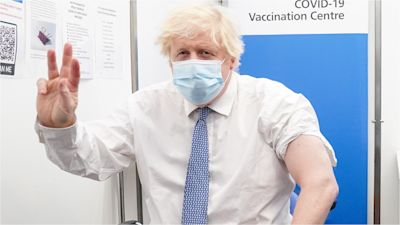Insight
How will the Covid booster rollout work and will the NHS cope under the added pressure?

What does the vaccine rollout mean for the already under pressure NHS? ITV News Deputy Political Editor Anushka Asthana explains
"All adults to be offered booster jab" - this headline landed three days ago after new advice from the Joint Committee on Vaccination and Immunisation suggested that the gap between the second and third Covid vaccines could be reduced from six to three months.
Cue an online deluge as people rushed to book their place, some being told they were two in the queue, others finding they were number 3,000.
Others turned up for walk-in jabs, only to be told they were too young.
In reality, the advice did not actually trigger a change in system - that was for the NHS to put in place. On Friday, NHS England explained how it will.
Is the booster vaccine programme going to be a challenge?
The first thing to say is that, at a national level, the old system remains in place, with the booking system opening - for over 40s - five months after their last jab, allowing them to book for six months.
Some regions have updated more quickly and will allow a shorter gap, but the overall system hasn't changed.
A new letter from NHS England chief executive Amanda Pritchard sets out plans to move to the three-month gap by December 13 at the latest - so people could have a small wait yet.
And even then it will be done in descending age - starting with the over 40s and then cascading down in five-year brackets.
When that comes into place - overnight, seven million extra people will become eligible for their booster.
How can the NHS deal with that?
In England, they have ordered hospital vaccine hubs to be expanded, with doctors and nurses redirected to them, students brought into when they are not in education and the military joining up to help the logistical effort.
But for GPs to be part of the movement they say they need capacity easing elsewhere. So the letter also promises that until March 2022 routine health checks for the over 75s and new patients can be deferred.
Listen to the ITV News coronavirus podcast
Meanwhile, the so-called QOF system, through which family doctors are paid for the services they deliver, will be changed as well. While areas such as vaccination, cervical screening and other urgent areas, will continue to be "paid on the basis of practice performance", others will not. Instead, doctors will have their income protected even if they deliver fewer services.
The aim is to make way for a massive booster programme - which looks all more important after a major study at the University of Southampton showed just how effective these third jabs are. They could boost antibodies 30-fold and all-important T-cells three-fold.
That looks like good news for Omicron too. And since the programme began, the health service has been reassured to see the number of people in hospitals with Covid stabilise and then drop slightly.
But it is early days - and fears about the speed at which the new variant spread means the race is on between Omicron and the booster roll out.